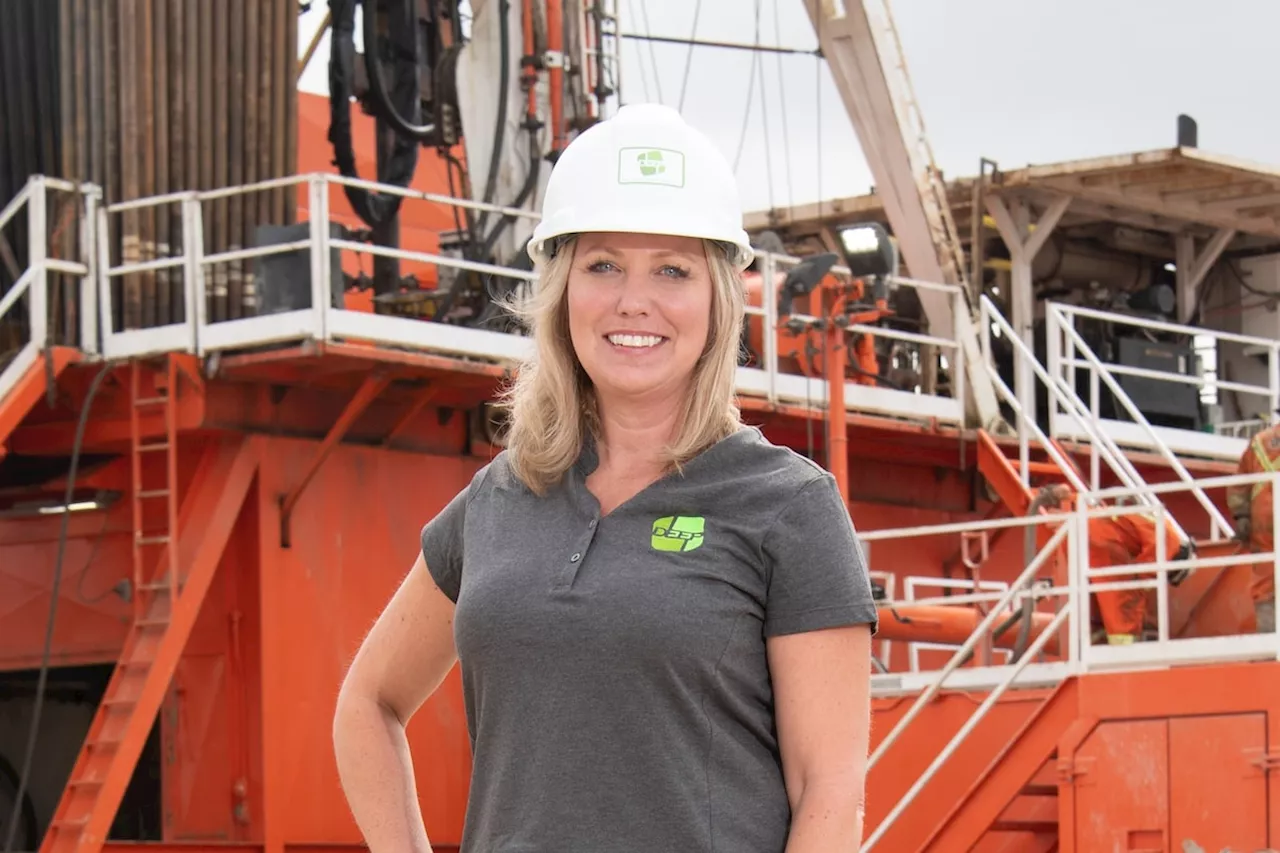DEEP, a company focused on building Canada's first geothermal power plant, has partnered with oilfield services giant Schlumberger to leverage its expertise in subsurface drilling and design. The project aims to generate low-emission electricity by tapping into underground steam reservoirs. This collaboration signals growing confidence in geothermal energy as a sustainable alternative to fossil fuels.
Kirsten Marcia, the chief executive officer of DEEP , states that Schlumberger 's decades of experience in subsurface drilling and design will instill confidence in equity investors. DEEP is dedicated to constructing Canada 's inaugural geothermal power plant, producing low-emission electricity by harnessing steam from underground reservoirs and bringing it to the surface.
This project is among a select group of endeavors across the country pursuing geothermal energy, fueled by government investments and a global surge towards net-zero emissions. The immediate focus lies in securing construction financing. Marcia highlights Schlumberger's significant global presence in all facets of the project, encompassing the development of two production and two injection wells in phase one, with the potential to expand to 18 wells in phase two. Geothermal energy has witnessed a surge in interest in recent years, coinciding with the world's escalating demand for electricity and the imperative to mitigate greenhouse gas emissions. Conventional geothermal energy production, which extracts fluids from deep, hot underground reservoirs to drive turbines, is considered a promising alternative to coal or natural gas. Unlike wind or solar power, which provide intermittent energy to the grid, geothermal offers reliable and continuous power generation. However, geothermal energy's relatively high cost has traditionally made it less appealing compared to other renewable sources. Nevertheless, heightened interest is gradually driving down prices and fostering more efficient technologies. Despite recent setbacks faced by renewables in fossil fuel-dependent economies like Alberta, geothermal's strong ties to the conventional oil drilling sector present a compelling advantage. Ms. Garcia explains that geothermal essentially mirrors oil and gas drilling but seeks heat instead of fossil fuels. She emphasizes that the conventional energy sector strongly supports geothermal because it utilizes the same services, supplies, and technology. Companies in this sector have shown little interest in wind or solar due to a lack of crossover in skills and technology. In contrast, geothermal offers numerous opportunities for collaboration. DEEP demonstrates this commitment by partnering with established players like Schlumberger, mitigating project risks and accelerating timelines. They are also exploring innovative technologies like Eavorloop, which utilizes a sealed-off, closed-loop system that bypasses the need for a permeable aquifer. This system functions akin to a vehicle radiator, circulating fluid in a closed loop to extract heat, making it highly scalable and deployable in diverse locations. E2E, on the other hand, is spearheading a project to repurpose Alberta's existing oil and gas infrastructure for geothermal power generation, leveraging the Alberta Drilling Accelerator's recent $50 million investment. This proposed open-access facility, funded through a public-private partnership, will be Canada's first technology-agnostic, industry-led test site, enabling companies to develop and test various geothermal technologies. DEEP's initial phase, slated for completion in 2026, aims to generate approximately five megawatts of power, sufficient for 1,250 homes. The project is designed in stages, with an ultimate goal of reaching approximately 180 megawatts of renewable power generation
GEOTHERMAL ENERGY CANADA SCHLUMBERGER DEEP RENEWABLE ENERGY CLIMATE CHANGE OIL AND GAS INVESTMENT
Canada Latest News, Canada Headlines
Similar News:You can also read news stories similar to this one that we have collected from other news sources.
 Arctic Cold Plunges Canada into Deep FreezeA mass of frigid air from the Arctic has swept across Canada, causing temperatures to plummet and wind chills to reach -40 Celsius or lower. Meteorologists explain this phenomenon as a southward meander of cold air, known colloquially as a polar vortex. Extreme cold warnings are in place across the country, prompting officials to advise against non-essential travel and urging people to take precautions against the biting cold.
Arctic Cold Plunges Canada into Deep FreezeA mass of frigid air from the Arctic has swept across Canada, causing temperatures to plummet and wind chills to reach -40 Celsius or lower. Meteorologists explain this phenomenon as a southward meander of cold air, known colloquially as a polar vortex. Extreme cold warnings are in place across the country, prompting officials to advise against non-essential travel and urging people to take precautions against the biting cold.
Read more »
 US Benefits as Much From Canada Trade as Canada Does, Report SaysA new report by economist Jim Stanford finds that the US benefits at least as much from trade with Canada as Canada does, contradicting claims made by incoming US President Donald Trump.
US Benefits as Much From Canada Trade as Canada Does, Report SaysA new report by economist Jim Stanford finds that the US benefits at least as much from trade with Canada as Canada does, contradicting claims made by incoming US President Donald Trump.
Read more »
 Canada's Inflation Eases, But Bank of Canada Faces Tough Trade-OffCanada's inflation rate dipped in December, but a leading economist warns that the Bank of Canada will likely prioritize stimulating the economy over immediate inflation control, given the looming threat of US tariffs and slowing growth.
Canada's Inflation Eases, But Bank of Canada Faces Tough Trade-OffCanada's inflation rate dipped in December, but a leading economist warns that the Bank of Canada will likely prioritize stimulating the economy over immediate inflation control, given the looming threat of US tariffs and slowing growth.
Read more »
 Canada Deploys Helicopters and Drones to Strengthen U.S.-Canada Border SecurityCanada is bolstering security along its border with the U.S. by deploying helicopters, drones, and advanced surveillance technology. Public Safety Minister David McGuinty announced these measures, citing a significant drop in illegal crossings since June 2024 due to visa restrictions.
Canada Deploys Helicopters and Drones to Strengthen U.S.-Canada Border SecurityCanada is bolstering security along its border with the U.S. by deploying helicopters, drones, and advanced surveillance technology. Public Safety Minister David McGuinty announced these measures, citing a significant drop in illegal crossings since June 2024 due to visa restrictions.
Read more »
 Health Canada says synthetic red food dye banned by FDA poses no human risk in CanadaTORONTO — Health Canada says a synthetic dye newly banned from the U.S. food supply does not pose a health risk to the general population in Canada. The federal agency said it won’t echo a ban by the U.S.
Health Canada says synthetic red food dye banned by FDA poses no human risk in CanadaTORONTO — Health Canada says a synthetic dye newly banned from the U.S. food supply does not pose a health risk to the general population in Canada. The federal agency said it won’t echo a ban by the U.S.
Read more »
 New Canada coach Casey Stoney recalls past encounters with Canada on the pitchNew Canada women's coach Casey Stoney has vivid memories of facing Canada on the football pitch. At the 2012 London Olympics, Stoney experienced the high of captaining Britain to a 1-0 win over Brazil before a crowd of 70,584 at Wembley Stadium.
New Canada coach Casey Stoney recalls past encounters with Canada on the pitchNew Canada women's coach Casey Stoney has vivid memories of facing Canada on the football pitch. At the 2012 London Olympics, Stoney experienced the high of captaining Britain to a 1-0 win over Brazil before a crowd of 70,584 at Wembley Stadium.
Read more »
